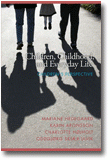
Children, Childhood and Everyday Life
Children’s Perspectives
Edited by:
Mariane Hedegaard, University of Copenhagen
Karin Aronsson, Stockholm University
Charlotte Højholt, Roskilde University
Oddbjørg Skjær Ulvik, Oslo and Akershus University College of Applied Sciences
Published 2012
Children live their lives across various social settings, including homes, kindergartens, schools and different kinds of institutions. The different contributions of this book focus on children’s perspectives, and on how children learn and develop through taking part in activities in social communities such as families, peer groups, classrooms, and day care institutions. This collection illustrate different ways of dealing with varying social contexts, and the research presented involves questions about children’s world-making, anchored in children’s daily lives. The studies are inspired by Vygotsky’s theory of development (1998), as well as childhood sociology. One of the aims has been to problematice time, change, continuity, developmental trajectories, and transitions in order to identify novel ways of discussing different trajectories through childhood and youth, that is ”development”.
CONTENTS
Introduction, Mariane Hedegaard, Karin Aronsson, Charlotte Højholt and Oddbjørg Skjær Ulvik. SECTION I: DEVELOPMENT, CHANGE, AND CHILDREN’S PERSPECTIVES ON SOCIAL LIFE. Being a Child, Coming of Age: Exploring Processes of Growing Up, Liv Mette Gulbrandsen. “Being Oneself” and “Being of Use”: On Children’s Appropriation of Values, Ruth E. Toverud. “Remaining the Same” and Children’s Experience of Development, Pernille Hviid. SECTION II: FAMILY LIFE PRACTICES AS AN ARENA FOR NEGOTIATIONS AND FORMAL LEARNING. Children’s Creative Modeling of Conflict Resolutions in Everyday Life as Central in their Learning and Development in Families, Mariane Hedegaard. Family Life Activities and Everyday Time Politics, Karin Aronsson. Money Talks: Children’s Consumption and Becoming in the Family, Lucas Gottzén. Foster Parenting as Cultural Practices: Foster Parents’ Developmental Goals and Strategies for Their Foster Children, Oddbjørg Skjær Ulvik. Family Problems: Exploring Dilemmas and Complexities of Organizing Everyday Family Life, Dorte Kousholt. SECTION III: SCHOOLS AS SOCIAL ARENAS. A Paradox of Inclusion: Administrative Procedures and Children’s Perspectives on Difficulties in School, Maja Røn Larsen. Using the Child Perspective to Support Children with Severe Impairments in Becoming Active Subjects, Louise Bøttcher. Social Identities in Transition: Contrasting Strategies of Two Boys When Changing School, Ditte Winther-Lindqvist. Communities of Children and Learning in School: Children’s Perspectives, Charlotte Højholt.
-
Paperback978-1-61735-734-3
Web price: $45.04 (Reg. 52.99)
-
Hardcover978-1-61735-735-0
Web price: $80.74 (Reg. 94.99)
- eBook978-1-61735-736-7

- EDU038000 - EDUCATION: Student Life & Student Affairs
- EDU037000 - EDUCATION: Research
- FAM000000 - FAMILY & RELATIONSHIPS: General
-
 (Re)Envisioning Social Studies Education Research
Current Epistemological and Methodological Expansions, Deconstructions, and Creations
(Re)Envisioning Social Studies Education Research
Current Epistemological and Methodological Expansions, Deconstructions, and Creations
-
 Affirming Identity, Advancing Belonging, and Amplifying Voice in Sororities and Fraternities
Affirming Identity, Advancing Belonging, and Amplifying Voice in Sororities and Fraternities
-
 Creating New Possibilities for the Future of HBCUs
From Research to Praxis
Creating New Possibilities for the Future of HBCUs
From Research to Praxis
-
 Latinx College Students
Innovations in Mental Health, Advocacy, and Social Justice Programs
Latinx College Students
Innovations in Mental Health, Advocacy, and Social Justice Programs
-
 Learning to Hide
The English Learning Classroom as Sanctuary and Trap
Learning to Hide
The English Learning Classroom as Sanctuary and Trap
-
 Special Education During the Pandemic
Considerations for Change in Practice
Special Education During the Pandemic
Considerations for Change in Practice
-
 What Comes After Lunch?
Alternative Measures of Economic and Social Disadvantage and Their Implications for Education Research
What Comes After Lunch?
Alternative Measures of Economic and Social Disadvantage and Their Implications for Education Research

